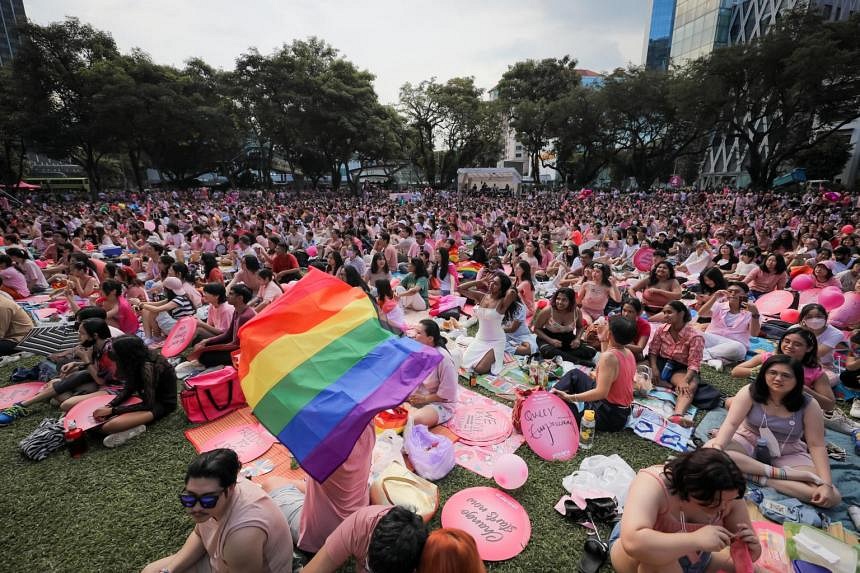SINGAPORE - What Singapore does with its colonial-era law that criminalises sex between men goes beyond the law itself and has broader societal concerns, said Deputy Prime Minister Lawrence Wong.
While views on the law and criminalisation of homosexual behaviour have evolved, a large part of the population is concerned about whether the repeal of Section 377A of the Penal Code will change society's values around family and marriage, he said on Monday (Aug 15).
The Republic's way of addressing the issue is to engage the different groups to reach an accommodation on the way forward without deepening divisions, a process that is under way, he added.
Mr Wong made the point in response to a question by Bloomberg editor-in-chief John Micklethwait, who had asked him when the law would be scrapped.
Calling Mr Wong a "modern man" and a cosmopolitan who had studied at Harvard, Mr Micklethwait said: "It must be very embarrassing having a law like that when you are trying to bring people to come to Singapore."
Mr Wong, who is also Finance Minister, replied that it is well understood that the law was a legacy left behind by the British, and that the Government is aware that many other Asian countries that were former British colonies have repealed it over the years.
"But we also know that in Singapore, there are many segments who feel that it is not just about the law, but the law is a marker for other things," he said.
"Things that they care about - about society, societal values, about family and about marriage - so it is not about the law per se but about these other things."
Singapore’s highest court had ruled in February that S377A cannot be used to prosecute men for having gay sex.
Mr Micklethwait also noted in the interview that United States House Speaker Nancy Pelosi brought up the law during her visit to Singapore earlier this month.
She had called on business groups to support the lesbian, gay, bisexual, transgender and queer (LGBTQ) community in Singapore.
Whether S377A should go is something for Singapore and Singaporeans to decide, said Mr Wong, a position that the Government has reiterated over the years.
Following Mrs Pelosi's visit, the Ministry of Home Affairs reminded foreign businesses to be careful about advocacy on issues in Singapore that could be socially divisive.
Asked if there was evidence that most Singaporeans are against getting rid of the law or if it was just a substantial majority who are against repeal, Mr Wong repeated that there are two issues at play.
"The law is one matter. Views on the law and criminalisation of homosexual behaviour certainly have evolved, have changed, but there are also views around family and marriage, which are different from the first matter, which I have highlighted," he said.
"People do feel strongly about the latter, on family values and marriage."
The broader issue is therefore not about S377A but how Singapore organises itself as a society, said Mr Wong.
"(This includes) whether or not values around family, around marriage will be changed, and those are the concerns that the larger segment of Singaporeans is concerned about," he said.
"That is why this engagement and this conversation that we are having now with these different segments of society are important."
Mr Micklethwait raised the issue of visas for same-sex spouses, noting how somebody who is legally married to someone elsewhere cannot bring their spouse to Singapore under the same visa.
Mr Wong said he had seen some of that feedback for people who have faced difficulties with partners, adding: "We have been able to deal with some of that on a case-by-case basis."
He said the Government will manage the matter of S377A carefully and sensitively as it pertains to social values and norms, the same way it does for a range of different issues.
"Whether it is race or religion, or whether it is regarding sexuality, we know that these are issues where different segments of society hold deep views and sometimes opposing views."


